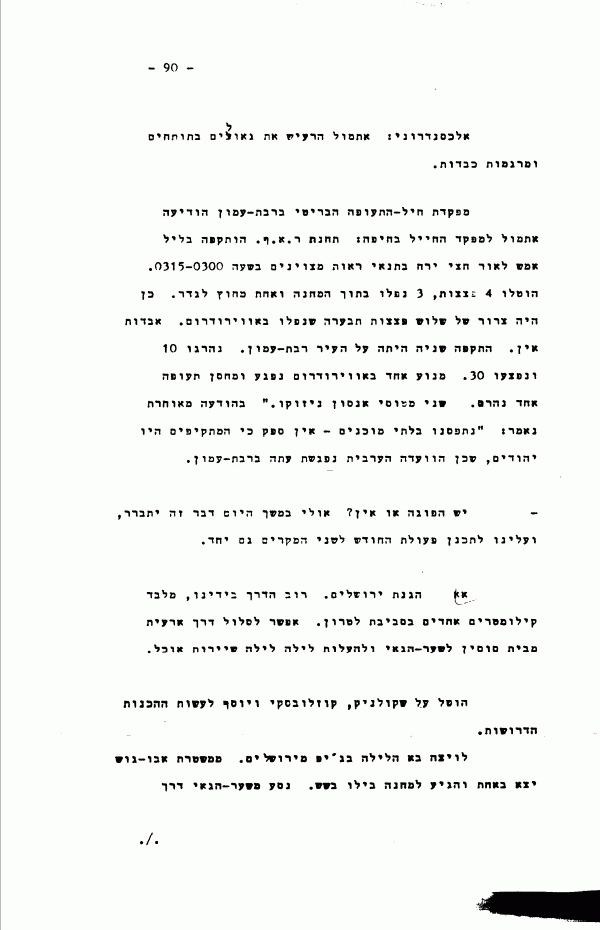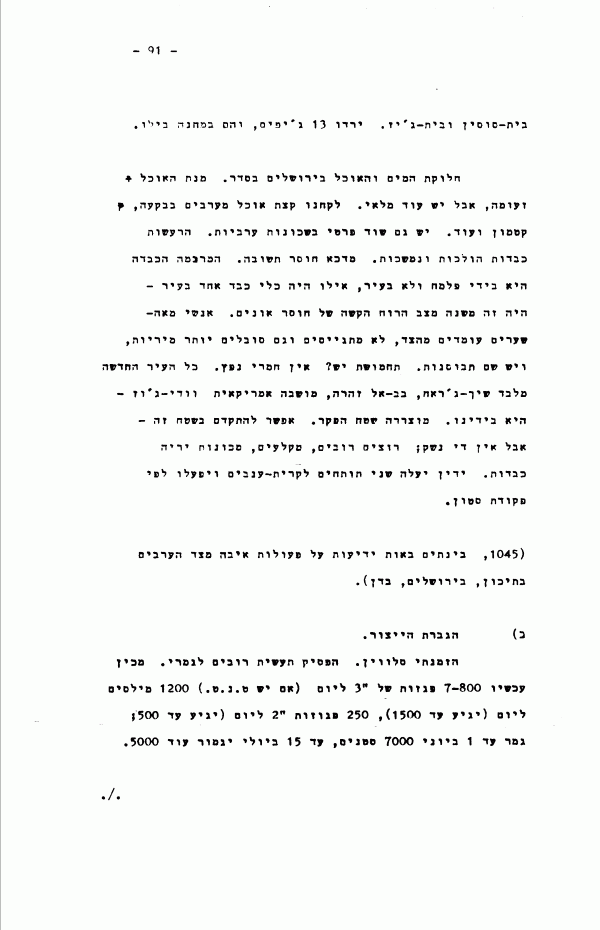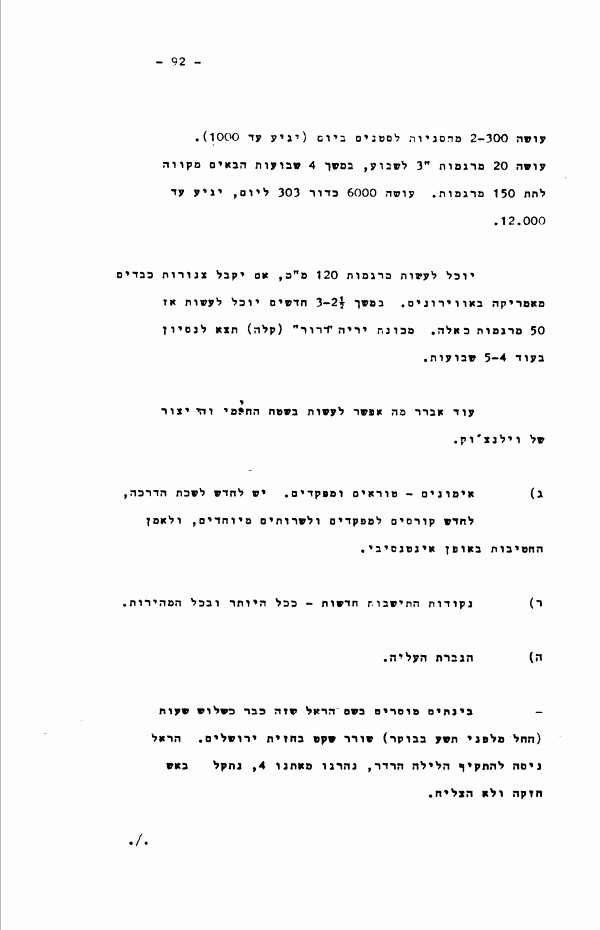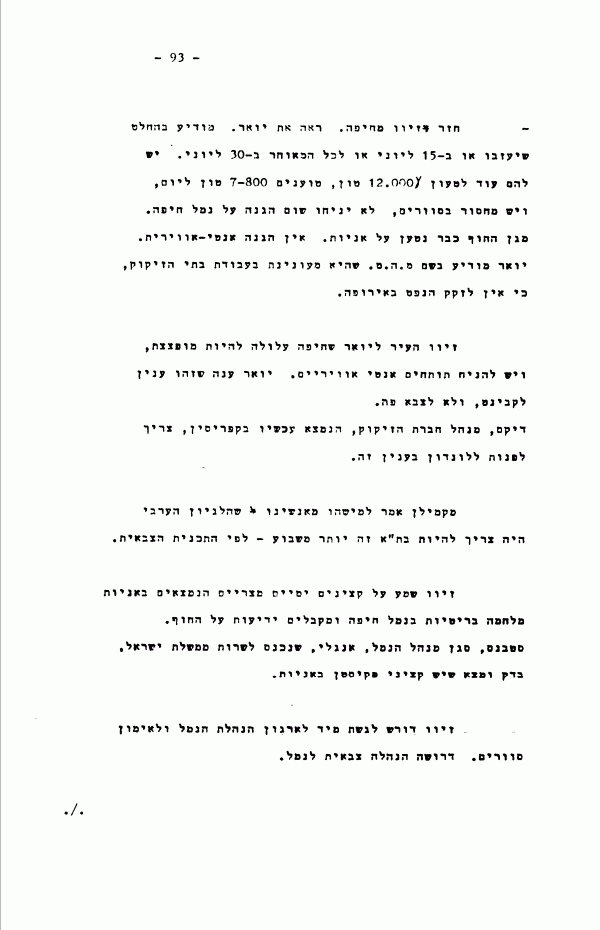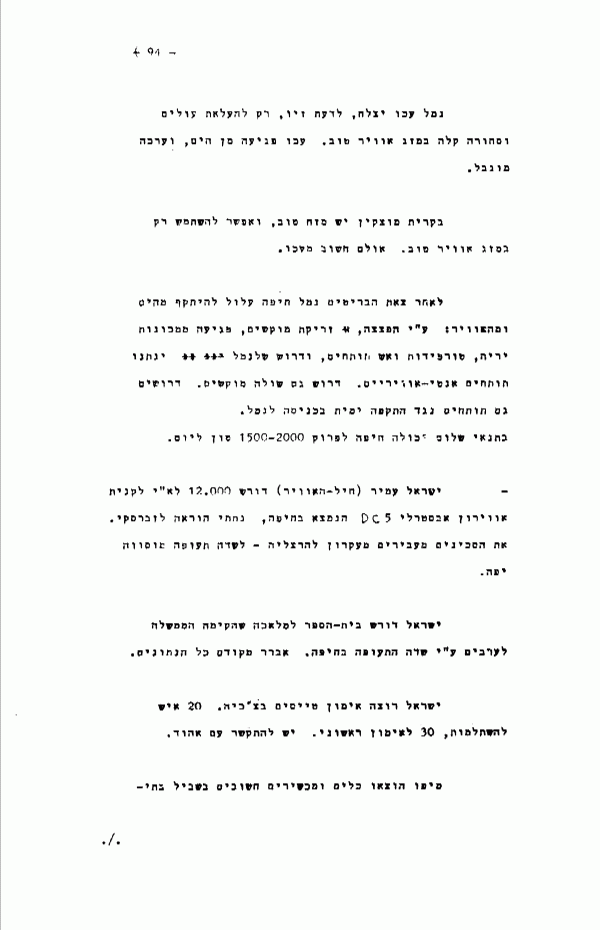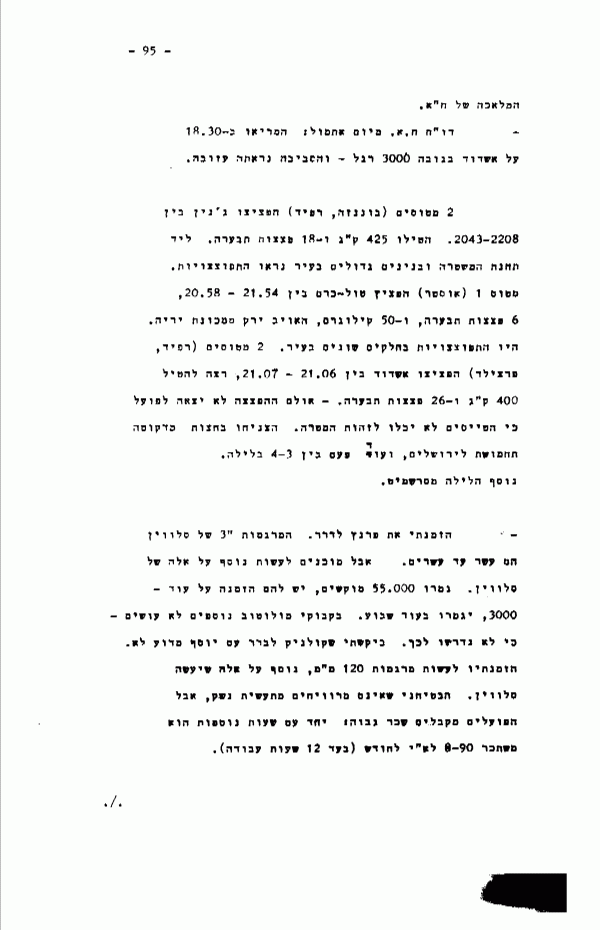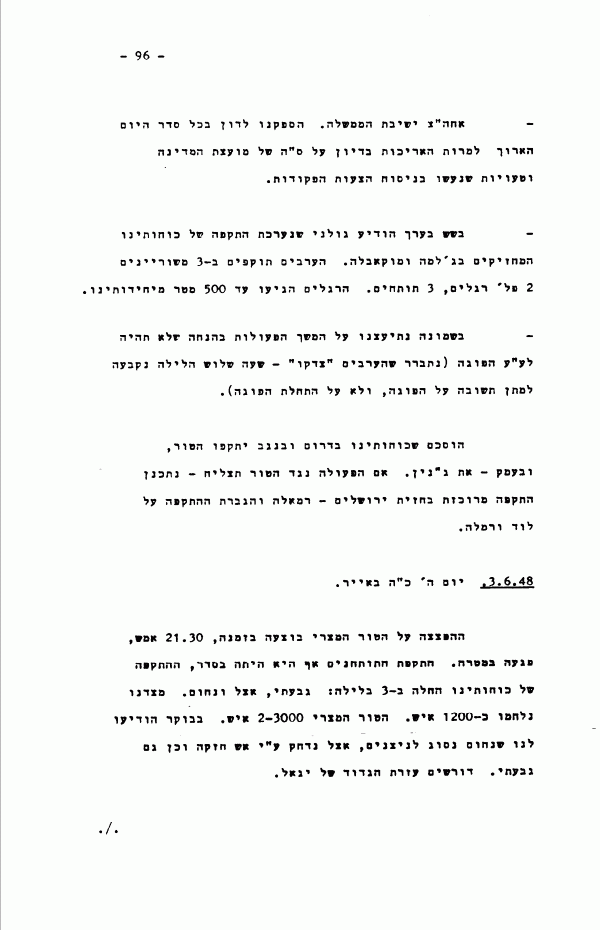[Wednesday,] June 2, 1948
At 3 a.m. Yigael woke me [to say] that according to Reuter the Arabs had agreed to a truce, and he asked what we should do with the Givati forces and Nahum [Sarig, of the Negev Brigade], who are set to attack the [Egyptian] column only at 3:30. In Yigael's opinion, it's not a good idea because the odds are 50-50. I agreed with him.
This morning (at 9) Yigael informed me that Egyptian planes had bombed Hulda, and that this morning an Egyptian force had attacked Negba with a number of armored vehicles. Golani has conquered a few villages north of Jenin, but not the city (Muqeibla, Arranah, Jalamah).
News from the front (!) [the Jerusalem front, under the command of D. Marcus]: The 7th Brigade, 0815 hours: This morning 2 Egyptian Spitfires circled above us for 15 minutes and at 0800 bombed Hulda.
Givati: 0645 hours: Camp Julis reports that enemy cannons are shelling Negba from a point between Majdal and Iraq-Suweidan, and at 0745 hours: seven tanks broke through to Negba - and Givati asks: whether to respond or not [because of the truce…]. Strange question!
Alexandroni: Yesterday [the Iraqi army] shelled Geulim using cannons and heavy mortars.
Yesterday the British air force headquarters in Amman informed the force's commander in Haifa: An RAF station was attacked the previous night by the light of a half-full moon, under excellent visibility conditions at 0300-0315. 4 bombs were dropped, 3 fell inside the camp and one outside the fence. There was also a burst of three incendiary bombs that fell in the aerodrome [airfield]. No losses. There was a second attack on the city of Amman. 10 were killed and 30 injured. One engine in the aerodrome was hit, and one airfield warehouse was destroyed. Two Anson planes were damaged. A later message stated: We were caught unprepared - there's no doubt that the attackers were Jews, given that the Arab Committee is currently meeting in Amman.
Is there or isn't there a truce? - The question might be resolved later day, and we must plan the month's activities simultaneously for both cases:
A) Food for Jerusalem. Most of the road [to Jerusalem] is in our hands, except for a few kilometers near Latrun. We can pave a temporary route from Beit Susin to Sha'ar HaGai [the "Burma Road"] and send food convoys nightly.
Shkolnik [Levi Eshkol], Kozlowski [Sapir], and Yosef [Avidar] were tasked with making the necessary preparations.
Levitze [Yitzhak Levi] arrived tonight by jeep from Jerusalem. He left the Abu Gosh police at one and reached Camp Bilu at six. He drove from Sha'ar HaGai through Beit Susin and Beit Jiz. 13 jeeps came down [from Jerusalem] and are at Camp Bilu.
The distribution of water and food in Jerusalem is [going] all right. The food ration is very small but there's still a reserve. We took a little food from Arabs in Baq'a, Katamon, and elsewhere. There's also personal theft in Arab neighborhoods. Heavy shelling is continuing. The lack of a response is depressing. The heavy mortar is in the hands of the Palmach, not in the city. If there were one heavy weapon in the city - it would change the grave sense of helplessness. The residents of Meah She'arim are standing on the sideline. They're not enlisting and they're also suffering more from the gunfire, and there is a sense of defeatism there.
Is there ammunition? - There are no explosives.
All of the new city except for Sheikh Jarrah, Bab A-Zahara [the area around Herod's Gate and the Rockefeller Museum], the American Colony, and Wadi Joz is in our hands. Musrara [today - Morasha] is a no man's land. It would be possible to advance in this area - but there's not enough weaponry: [they] want rifles, [light] machine guns, heavy machine guns. Yadin will bring two cannons to Kiryat ''Anavim and they'll operate under Stone's command.
(In the meantime (1045) there's news about Arab acts of hostility in the center, in Jerusalem, in Dan.)
B) Increasing production. I summoned Slavin. He's completely stopped producing rifles. He's now making 700-800 shells for 3" [mortars] (if there's TNT), 1,200 Mills [grenades] per day (he'll reach 1,500). 250 2" shells per day (he'll reach 500). By June 1 he finished 7,000 Stens, by July 15 he'll finish another 5,000. He's making 200-300 Sten magazines per day (he'll reach 1,000). He's making twenty 3" mortars per week. Over the next 4 weeks he hopes to provide 150 mortars. He's making 6,000 of the 0.303 bullets per day. He'll reach 12,000.
He'll be able to make 120 mm mortars if he gets heavy pipes from America by plane. He could then make 50 such mortars over the course of 2½-3 months.
Trial use of the (light) machine gun Dror will begin in 4-5 weeks.
I'll also assess what can be done in the chemical and production area by Vilenchik.
C) Training - privates and commanders. The Training Bureau should be resurrected, courses for commanders and special services should be resumed, and the brigades should receive intensive training.
D) New settlements - as many as possible and at full speed.
E) Increased aliyah.
In the meantime it's been conveyed on behalf of Harel that for three hours now (since before 9 a.m.) the Jerusalem front has been quiet. During the night Harel tried to attack Radar [Hill], 4 of ours were killed, it encountered heavy fire and didn't succeed.
- [Marcus] Sieff returned from Haifa. He'd seen Youer [possibly Sir Hugh Dow, British Foreign Office envoy]. He relays that they will definitely leave either on June 15 or, at the latest, June 30. They have another 12,000 tons to load up, they're loading 700-800 tons per day, and they have a shortage of dockworkers. They won't leave behind any defense of Haifa Port. The coastal shield [a network against submarine invasion] has already been installed on ships. There's no anti-air defense. Youer relays on behalf of HMG [His Majesty's Government] that it's interested in the refineries' operations because the oil cannot be refined in Europe.
Sieff pointed out to Youer that Haifa could be bombed, and that anti-air cannons should be put in place. Youer replied that this was a matter for the Cabinet, not the military here. Dix, manager of the refinery company, who is now in Cyprus, needs to approach London regarding this matter.
General MacMillan [commander of British forces in Palestine, who oversaw the British withdrawal] told of one our men that the Arab Legion should have been in Tel Aviv more than a week ago - according to the military plan.
Sieff heard about Egyptian naval officers who are on British warships in the Haifa Port, and receiving information on shore // news about [developments] on shore. Stevens, the port's deputy manager, who's English and entered government service for Israel, checked and found that there are Pakistani officers on the ships.
Sieff is insisting that work begin immediately on the organization of the port administration and training of dockworkers. We need a military administration for the port.
The Acre port, in Sieff's opinion, will only be useful for bringing in immigrants and light cargo in good weather. Acre is vulnerable from the sea, and is of limited value.
There's a good dock in Kiryat Motzkin, which can only be used in good weather, but it's more important than Acre.
After the British leave, the Haifa port could be attacked from the sea and from the air by means of shelling, tossing of mines, machine gun strikes, torpedoes, and cannon fire, and the port needs to have anti-air cannons, as well as a minesweeper. It also needs cannons to fend off a naval attack at the entry to the port.
Under conditions of peace, Haifa could unload 1,500-2,000 tons per day.
- Yisrael Amir (air force) is requesting P£ 12,000 to buy an Australian DC-5 currently in Haifa. I gave instructions to Zabrasky. The "Knives" [Messerschmitts] are being transferred from Ekron to Herzliya - to a nicely camouflaged airfield.
Yisrael [Amir] is demanding [for his use] a vocational school that the government established for the Arabs near the airfield in Haifa. I'll look into all the details first.
Yisrael wants pilots to be trained in Czechoslovakia. 20 men for supplemental training, 30 for initial training. Need to contact Ehud [Avriel].
Important tools and instruments have been taken from Jaffa for the air force workshops.
Air force report from yesterday: At 18:30 they flew over Ashdod at a height of 3,000 feet - and the area looked deserted.
Two planes (Bonanza, Rapid) bombed Jenin between 21:43 and 22:08. They dropped 425 kg [total explosive material in bombs dropped] and 18 incendiary bombs. Explosions were seen near the police station and tall buildings in the city. One plane (Auster) bombed Tulkarm between 20:58 and 21:45, 6 incendiary bombs and 50 kg [total explosive material in bombs dropped]. The enemy fired a [heavy] machine gun. There were explosions in various parts of the city. Two planes (Rapid, Fairchild) bombed Ashdod between 21:06 and 21:07; they wanted to drop 400 kg and 26 incendiary bombs - but the bombardment wasn't executed because the pilots couldn't identify the target. At midnight a Dakota [aircraft] airdropped ammunition for Jerusalem, and again between 3 and 4 a.m.
Another Messerschmitt was added tonight.
- I summoned Franz Lederer. So far they [Solel Boneh] have been producing [Haim] Slavin's 3" mortars. But they're prepared to make more, in addition to Slavin's. They finished 55,000 mines, and they have an order for more - 3,000. They'll finish in a week. They're not making additional Molotov cocktails - because they weren't required do so. I asked Shkolnik [Eshkol] to check with Yosef [Avidar] as to why not. I requested that he make 120 mm mortars, in addition to those Slavin will make.
I was promised that they're not making a profit from the weapons industry, but the workers receive a high salary. With overtime, [a worker] earns P£ 80-90 per month (for 12 hours of work [per day]).
- Government meeting in the afternoon. We managed to discuss everything on the long agenda, despite lengthy deliberations regarding the State Council's agenda and mistakes made in formulating proposed orders [which the government had to approve].
- At 6 p.m. Golani reported on an ongoing attack against our forces holding Muqeibla and Jalamah [north of Jenin]. The Arabs are attacking with 3 armored vehicles, 2 infantry companies, 3 cannons. The infantry troops came within 500 m of our units.
At 8 we discussed continuing operations, assuming that for the moment there won't be a truce (turns out the Arabs were "right" - 3 o'clock was the time set for submitting a response regarding a truce, rather than the start of a truce).
We agreed that our forces in the south and the Negev would attack the [Egyptian] column [in Isdud], and in the Valley - Jenin. If the operation against the column is successful - we'll plan a concentrated attack on the Jerusalem-Ramallah front and intensification of the attack on Lod and Ramle.






